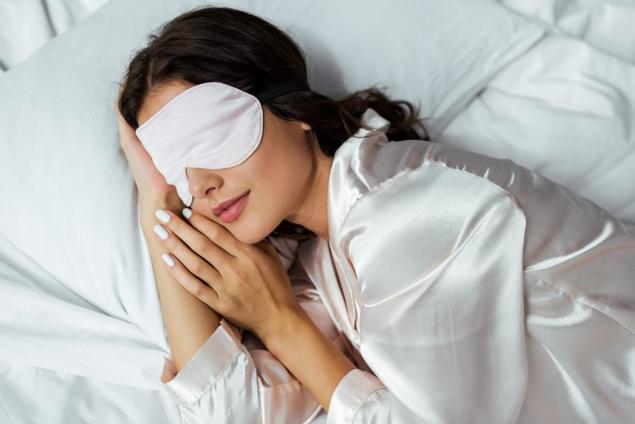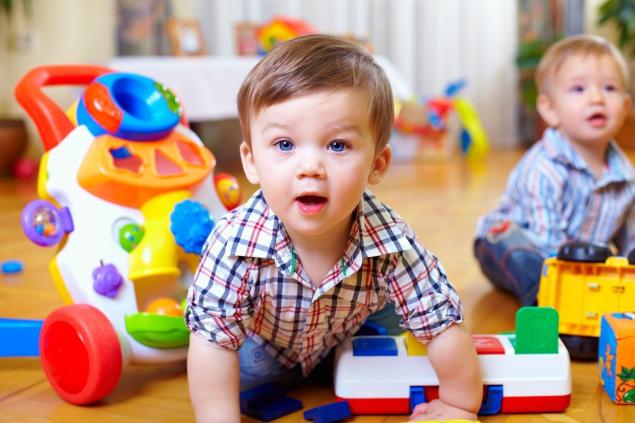207
How long should you put the child to bed and whether the baby needs strict bed rest
Why are we sleeping? Obviously to rest. But we rarely think about the importance of sleep, neglecting it. The student thinks that the time to sleep is a huge period of time that can be used for good: to prepare overnight for the exam or get a part-time job. The effect of lack of sleep manifests itself very quickly. Due to lack of sleep, a lot of accidents occur, a person ceases to navigate in space, the body gives up and “switches off”.

An adult, depending on his type of activity, is recommended to sleep 6-8 hours a day. This is the optimal period of time for which the body can partially recover from physical exertion, and the brain at this time is actively working, laying out the information that a person learned during the day, on shelves in his mental library.
Modern man is in stress every day, and the better his sleep, the lower the level of stress. By the way, the quality of sleep can be tracked using the usual fitness tracker, which is every second. Without sleep, a person becomes irritable, restless, distracted. Athletes and people who work physically should sleep at least 8 hours. In reality, this is not always feasible. But if you test your body, there is a high risk of getting an industrial injury or damage something during the next strength training. How does sleep affect the baby?

Babies up to a year sleep up to 20 hours a day. Interestingly, during this period, parents just can not fully sleep, because the child constantly wakes up in the middle of the night and begins to cry. If you go to the app on your phone and look at how many hours you slept, you will see that sleep is divided into phases: fast and slow.
The fast phase is 2/3 of all sleep, and the slow phase is only 1/3. The rapid phase of sleep always prevails, but the quality of sleep is determined by the slow phase - this is the time when the body recovers. In the rapid phase of sleep, a person turns and wakes up often, the same thing happens to a baby.

Parents are always worried about the baby when he wakes up at night. Yes, babies have colic or teeth cut, and they should be lulled. But it happens that parents themselves jump from the slightest sound from the nursery and finally wake up their child, without suspecting it.
A child up to a year can sleep continuously for 1.5 hours, then he wakes up and falls asleep again when his mother takes him in her arms. That's the quick phase. Then the rhythm of the child gradually forms, and instead of 20 hours, he sleeps for 12 hours. From a year to three years, the child sleeps 10-11 hours a day, including daytime sleep. Then the body gets used to the regime of the day, and up to 7 years the child sleeps an average of 10 hours. After 7 years, a child can sleep 8-10 hours a day without daytime sleep.

Now not only parents, but also small children lack sleep. According to statistics, 5% of children lack sleep on average 2 hours a day. This is due to computer games, the Internet and lessons. Schoolchildren at the initiative of parents attend additional sports sections, classes with tutors and so on.
Sleep deficiency affects a child differently than it does an adult. Sleep promotes growth. If the child regularly lacks sleep, he can significantly lag behind in physical development and grow slowly. The fact that the child does not get enough sleep is evidenced by fussiness, aggressiveness, forgetfulness and confusion in speech.

In addition, at an early age, the nervous system is disrupted. The child needs to ensure normal sleep conditions and teach sleep hygiene from an early age. The children's room should be clean and quiet, it is desirable to ventilate the room before bedtime. To fully recover and remember new words, facial expressions, everything that the child sees and tries to repeat, you need to sleep and monitor the phases of sleep.

To allow the child a good rest, it is important to accustom him to simple, but very important daily rituals. These simple actions are good for adults to learn. A few hours before bedtime, you need to turn off the computer, put the tablet and phone aside. Brush your teeth and take a shower. A warm shower helps to relax and prepare for sleep.
An active child can be offered reading a book or quiet games without gadgets before bedtime. If you think that your child sleeps well even with the TV on, you are mistaken. Think of the sleep phases. Shallow sleep does not allow the body to recover. This practice leads to rapid fatigue, lethargy and retardation. The child may lose his appetite. Only if all family members in the house respect the rest of others and try to adhere to sleep hygiene, they will be able to instill this useful habit in the child.

An adult, depending on his type of activity, is recommended to sleep 6-8 hours a day. This is the optimal period of time for which the body can partially recover from physical exertion, and the brain at this time is actively working, laying out the information that a person learned during the day, on shelves in his mental library.
Modern man is in stress every day, and the better his sleep, the lower the level of stress. By the way, the quality of sleep can be tracked using the usual fitness tracker, which is every second. Without sleep, a person becomes irritable, restless, distracted. Athletes and people who work physically should sleep at least 8 hours. In reality, this is not always feasible. But if you test your body, there is a high risk of getting an industrial injury or damage something during the next strength training. How does sleep affect the baby?

Babies up to a year sleep up to 20 hours a day. Interestingly, during this period, parents just can not fully sleep, because the child constantly wakes up in the middle of the night and begins to cry. If you go to the app on your phone and look at how many hours you slept, you will see that sleep is divided into phases: fast and slow.
The fast phase is 2/3 of all sleep, and the slow phase is only 1/3. The rapid phase of sleep always prevails, but the quality of sleep is determined by the slow phase - this is the time when the body recovers. In the rapid phase of sleep, a person turns and wakes up often, the same thing happens to a baby.

Parents are always worried about the baby when he wakes up at night. Yes, babies have colic or teeth cut, and they should be lulled. But it happens that parents themselves jump from the slightest sound from the nursery and finally wake up their child, without suspecting it.
A child up to a year can sleep continuously for 1.5 hours, then he wakes up and falls asleep again when his mother takes him in her arms. That's the quick phase. Then the rhythm of the child gradually forms, and instead of 20 hours, he sleeps for 12 hours. From a year to three years, the child sleeps 10-11 hours a day, including daytime sleep. Then the body gets used to the regime of the day, and up to 7 years the child sleeps an average of 10 hours. After 7 years, a child can sleep 8-10 hours a day without daytime sleep.

Now not only parents, but also small children lack sleep. According to statistics, 5% of children lack sleep on average 2 hours a day. This is due to computer games, the Internet and lessons. Schoolchildren at the initiative of parents attend additional sports sections, classes with tutors and so on.
Sleep deficiency affects a child differently than it does an adult. Sleep promotes growth. If the child regularly lacks sleep, he can significantly lag behind in physical development and grow slowly. The fact that the child does not get enough sleep is evidenced by fussiness, aggressiveness, forgetfulness and confusion in speech.

In addition, at an early age, the nervous system is disrupted. The child needs to ensure normal sleep conditions and teach sleep hygiene from an early age. The children's room should be clean and quiet, it is desirable to ventilate the room before bedtime. To fully recover and remember new words, facial expressions, everything that the child sees and tries to repeat, you need to sleep and monitor the phases of sleep.

To allow the child a good rest, it is important to accustom him to simple, but very important daily rituals. These simple actions are good for adults to learn. A few hours before bedtime, you need to turn off the computer, put the tablet and phone aside. Brush your teeth and take a shower. A warm shower helps to relax and prepare for sleep.
An active child can be offered reading a book or quiet games without gadgets before bedtime. If you think that your child sleeps well even with the TV on, you are mistaken. Think of the sleep phases. Shallow sleep does not allow the body to recover. This practice leads to rapid fatigue, lethargy and retardation. The child may lose his appetite. Only if all family members in the house respect the rest of others and try to adhere to sleep hygiene, they will be able to instill this useful habit in the child.
Why drug addiction is a disease and how to help the addict
Domestic actresses who in 60+ look so that even Hollywood beauty will envy























